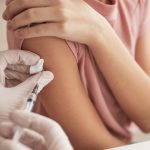Study reveals startling cancer spike after COVID shots, experts call for urgent review
 (NaturalHealth365) For years, COVID shots were promoted as humanity’s safest measure – framed as a triumph over a deadly virus. But a new large-scale study is forcing a reckoning: these injections may come with a hidden cost, one that no one really wants to acknowledge.
(NaturalHealth365) For years, COVID shots were promoted as humanity’s safest measure – framed as a triumph over a deadly virus. But a new large-scale study is forcing a reckoning: these injections may come with a hidden cost, one that no one really wants to acknowledge.
A massive, nationwide analysis of over 8.4 million people in Seoul, South Korea, now shows that people who received COVID shots had significantly higher risks of several cancer types just one year later. These results warrant serious scrutiny, especially given the widespread and frequent use of boosters.
Significant increases in cancer risk one year after COVID shots
The South Korean study used national health insurance data and rigorous statistical matching to compare vaxxed vs. unvaxxed individuals. Here’s what they found for six cancer types, based on hazard ratios (HR), which translate into increases in risk:
-
Thyroid cancer: +35.1% higher risk
-
Gastric (stomach) cancer: +33.5% higher risk
-
Colorectal cancer: +28.3% higher risk
-
Lung cancer: +53.3% higher risk
-
Breast cancer: +19.7% higher risk
-
Prostate cancer: +68.7% higher risk
The study also found that non-mRNA shots, mRNA shots, and mixed schedules (heterologous) each were linked with increased risks for different cancer types, and that younger adults under 65 were more vulnerable in several cases.
This isn’t just about cancer: Other known risks of COVID shots
The cancer findings may be the most alarming, but they aren’t the only danger that’s emerged. Real-world data increasingly links COVID shots to a range of serious and under-reported adverse events, such as:
-
Heart inflammation (myocarditis and pericarditis), especially in younger males
-
Neurological complications, including Guillain-Barré syndrome and long-term nerve damage
-
Blood clotting disorders and strokes in otherwise healthy people
-
Reproductive and menstrual disorders, fertility issues, and miscarriage risk in some studies
-
Sudden deaths and excess mortality, particularly in populations with many booster doses
Building immune strength without relying on Big Pharma “solutions”
If shots carry these risks, the obvious question becomes: how do we protect ourselves without them? The answer lies in strengthening the body’s own defenses. Here are practical, evidence-based strategies to enhance immunity naturally:
-
Optimize your nutrition: Ensure you get sufficient vitamin D, C, A, zinc, magnesium, and selenium, all of which are critical for immune surveillance.
-
Support detox pathways: N-acetylcysteine (NAC), milk thistle, glutathione, and cruciferous vegetables support liver and cellular detoxification.
-
Adopt an anti-inflammatory diet: Limit refined sugars, seed oils, and ultra-processed foods; emphasize wild-caught fish, organic nuts, green leafy vegetables, and berries.
-
Improve gut health: A healthy microbiome supports a robust immune system. Add fermented foods, prebiotics (such as fiber), and reduce unnecessary antibiotics.
-
Manage stress and sleep deeply: Cortisol and sleep deprivation suppress immune function. Use relaxation techniques and aim for 7–9 hours of quality sleep nightly.
-
Use evidence-based botanicals: Adaptogens and immune-modulating herbs (e.g., astragalus, reishi, elderberry) can help balance immune response.
These steps reinforce your body’s ability to resist infections, cancer, and chronic illness.
What should be done now to protect your health
If you’re concerned about long-term immunity, chronic inflammation, and potential cancer risks, it makes sense to take proactive, science-backed steps to support your immune system naturally. Jonathan Landsman’s Immune Defense Summit gathers insights from 34 leading scientists, researchers, doctors, and nutritionists, offering practical strategies for strengthening immunity, reducing inflammation, and protecting your health without relying on pharmaceutical interventions.
Get access to the Immune Defense Summit today and arm yourself with evidence-based approaches to help safeguard your health now and in the years ahead.
Sources for this article include:



